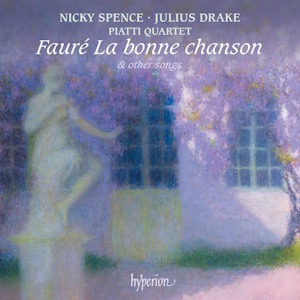
Gabriel Fauré (1845-1924)
La bonne chanson & other songs
Nicky Spence (tenor)
Julius Drake (piano)
Piatti Quartet
rec. 2023, St Silas the Martyr, Kentish Town, London
Sung texts with English translations enclosed
Reviewed as download
Hyperion CDA68450 [57]
La bonne chanson is generally regarded as Fauré’s greatest and most sophisticated song cycle. It was composed in 1892 when he was in his late forties and beginning to feel elderly, probably presaging the beginning of his deafness which became very obvious around the beginning of the new century.
When I began being interested in Fauré’s songs many years ago, it took me some time to become adjusted to his later songs – including La bonne chanson – since I missed the sweet melodiousness of the young Fauré, and I still return to that period with pleasure, while yet retaining a deep affection for La bonne chanson. Verlaine’s poetry has a magic atmosphere to it. My first – and for many years my only – recording was Gérard Souzay’s from 1960, and that is still my touchstone version. I dipped into that recording again before listening to the disc under review, and also the recent recording with Stéphane Degout, which doesn’t seem to have been reviewed on Music Web. Both are truly masterly readings, full of insight and sensitive nuances, and I wouldn’t hesitate to recommend either or both of them to someone who is on the verge of starting to build a collection of Fauré recordings.
However, the very first notes of Nicky Spence’s recording also made me sit up and prick up my ears, for here was lyrical singing of the utmost beauty of tone with heavenly diminuendos and no lack of power. His pianissimo singing is so sensitive and warm. Just listen to Avant que tu ne t’en ailles (track 6) to hear what I mean. Spence has made many good recordings the last few years but here he surpasses himself. What finally won me over, however, was the version he has chosen: it is not the original 1892 version with piano accompaniment, but Fauré’s own version from 1898 for voice, piano and string quintet. It adds an extra dimension of, let’s call it grandezza, but it is still in chamber format. I can’t remember hearing this version before, having skimmed through a good dozen of other recordings in my collection.
However, that is not the only reason to acquire this disc. The remaining tracks cover most of Fauré’s creative period – bar the last two decades – from the early Lydia, composed when he was little more than twenty, to the concluding Dans la forêt de septembre, written in 1902. The former is youthfully melodious, simple but beautiful, the latter from his autumnal period, somewhat lugubrious but with its own subdued beauty. In between these extremes we find favourites like Chanson d’amour, Le secret (magically sung) – both to texts by Sylvestre – En sourdine (that beautiful legato again), Mandoline and Clair de lune – all set to poems by Verlaine –and Nobel Prize winner Sully Prudhomme’s lullaby Les berceaux. It seems that Nicky Spence is especially attuned to Fauré, and with Julius Drake as his duo partner the cooperation could hardly be more homogenous. This also reminds me that I first heard Drake almost 37 years ago when he accompanied Hugues Cuénod at Wigmore Hall, when the Swizz veteran celebrated his 86th birthday with a full-length recital.
Anyone wanting a collection of Fauré’s songs need look no further than this, and personally I wouldn’t mind if Spence and Drake followed up this issue with a sequel.
Göran Forsling
Buying this recording via a link below generates revenue for MWI, which helps the site remain free


Contents
La bonne chanson, Op. 61
Lydia Op 4 No 2
Chanson d’amour Op 27 no 1
Le secret Op 23 No 3
En sourdine Op 58 No 2
Les roses d’Ispahan Op 39 No 4
Mandoline Op 58 No 1
Notre amour Op 23 No 2
Les berceaux Op 23 No 1
Poème d’un jour Op 21
Automne Op 18 No 3
Clair de lune Op 46 No 2
Dans la forêt de septembre Op 85 No 1

















